A Comprehensive Report on Attitudes to Mental Health - 20th Century
VerifiedAdded on 2023/06/13
|17
|4369
|286
Report
AI Summary
This report provides a critical analysis of attitudes towards individuals with mental health issues during the last two decades of the 20th century. It reviews literature on the prevalence of negative attitudes and stigmatization, examining studies on the effectiveness of interventions like the National Alliance on Mental Illness (NAMI) and comparing attitudes of psychiatric professionals versus the general public. The report highlights the impact of factors such as knowledge, education, professional experience, and familiarity with mental health issues on shaping attitudes. It also discusses the challenges in psychiatric care, the role of social exclusion, and the importance of awareness, education, and contact in improving mental health attitudes, concluding that despite efforts to improve attitudes, significant changes are lacking and advocating for effective strategies beyond education to combat stereotypes and enhance mental health care.
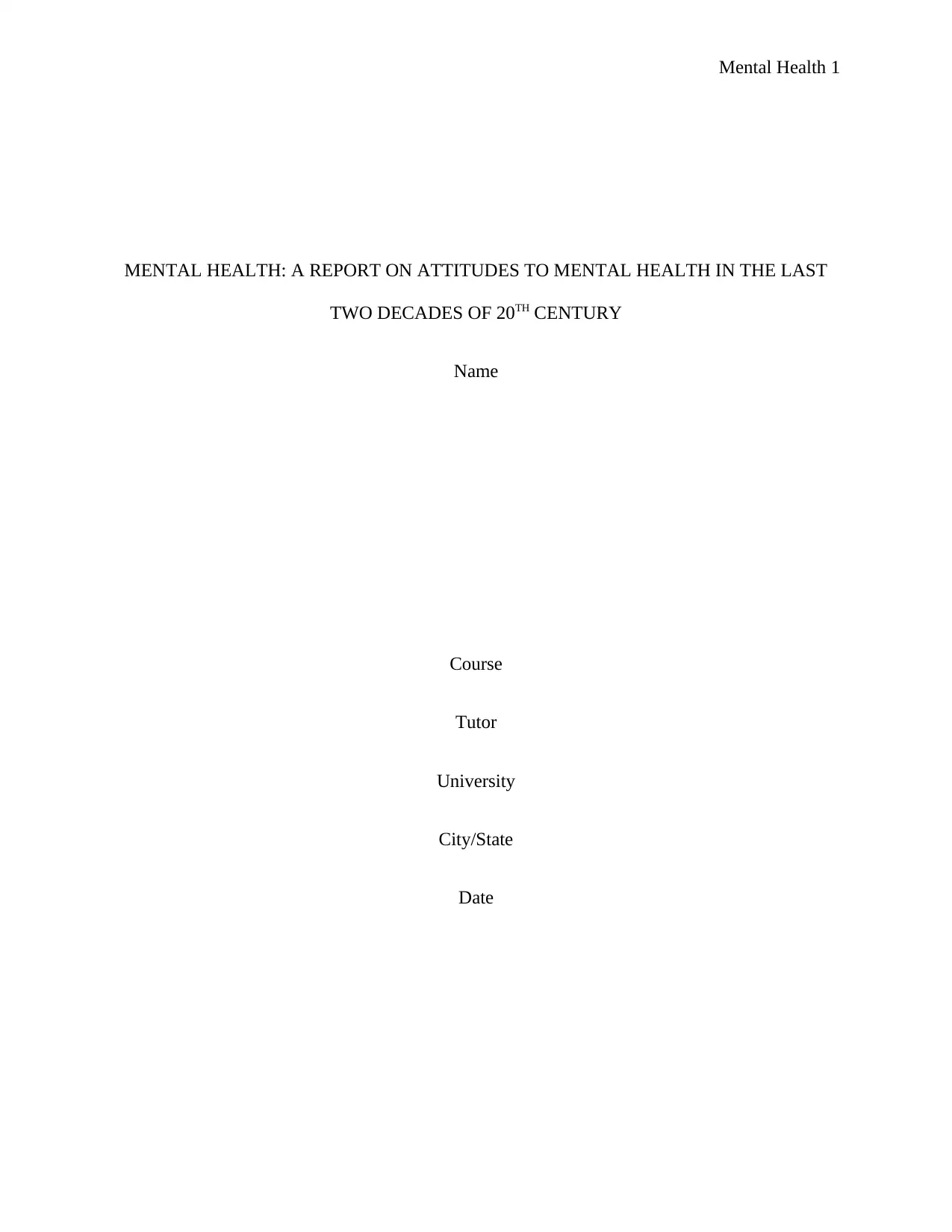
Mental Health 1
MENTAL HEALTH: A REPORT ON ATTITUDES TO MENTAL HEALTH IN THE LAST
TWO DECADES OF 20TH CENTURY
Name
Course
Tutor
University
City/State
Date
MENTAL HEALTH: A REPORT ON ATTITUDES TO MENTAL HEALTH IN THE LAST
TWO DECADES OF 20TH CENTURY
Name
Course
Tutor
University
City/State
Date
Paraphrase This Document
Need a fresh take? Get an instant paraphrase of this document with our AI Paraphraser
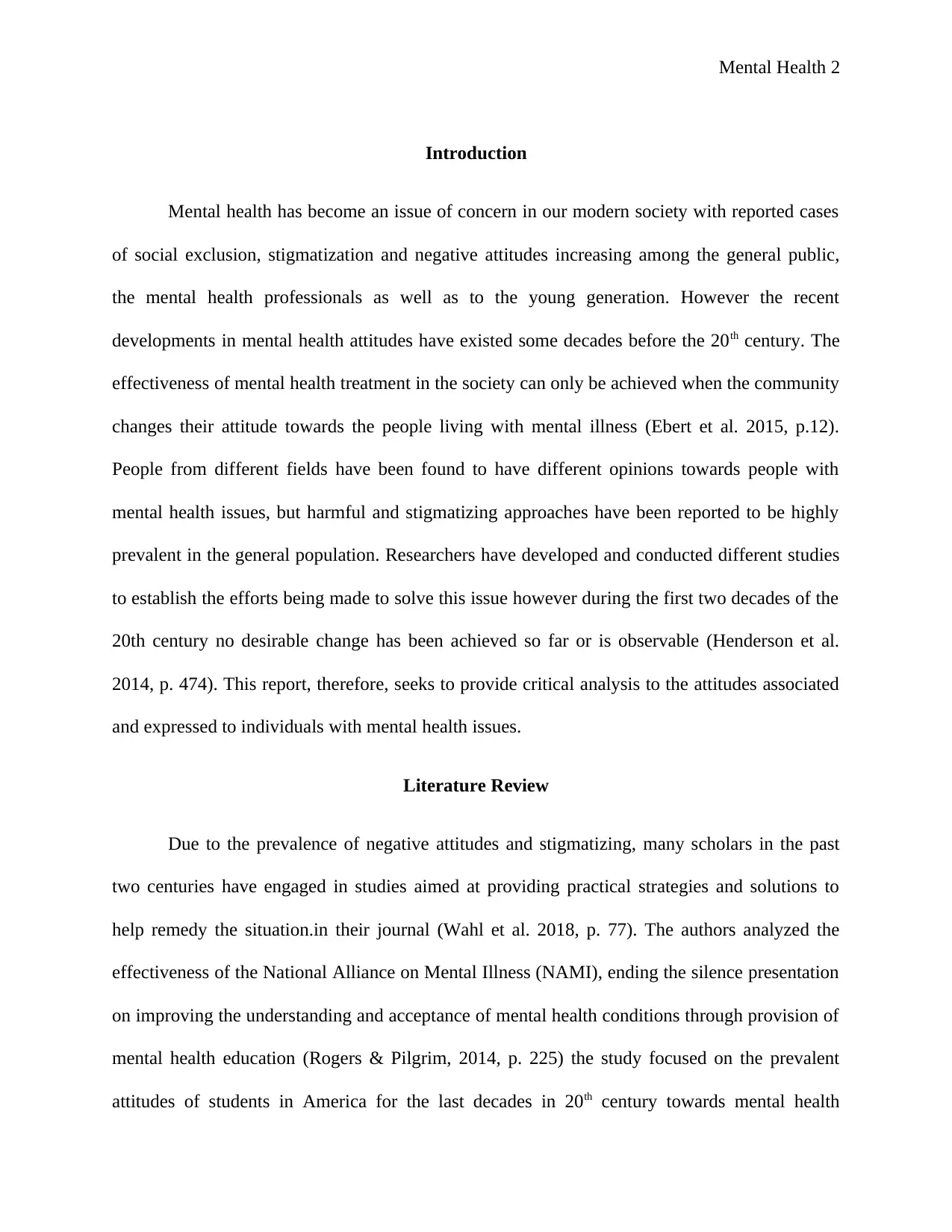
Mental Health 2
Introduction
Mental health has become an issue of concern in our modern society with reported cases
of social exclusion, stigmatization and negative attitudes increasing among the general public,
the mental health professionals as well as to the young generation. However the recent
developments in mental health attitudes have existed some decades before the 20th century. The
effectiveness of mental health treatment in the society can only be achieved when the community
changes their attitude towards the people living with mental illness (Ebert et al. 2015, p.12).
People from different fields have been found to have different opinions towards people with
mental health issues, but harmful and stigmatizing approaches have been reported to be highly
prevalent in the general population. Researchers have developed and conducted different studies
to establish the efforts being made to solve this issue however during the first two decades of the
20th century no desirable change has been achieved so far or is observable (Henderson et al.
2014, p. 474). This report, therefore, seeks to provide critical analysis to the attitudes associated
and expressed to individuals with mental health issues.
Literature Review
Due to the prevalence of negative attitudes and stigmatizing, many scholars in the past
two centuries have engaged in studies aimed at providing practical strategies and solutions to
help remedy the situation.in their journal (Wahl et al. 2018, p. 77). The authors analyzed the
effectiveness of the National Alliance on Mental Illness (NAMI), ending the silence presentation
on improving the understanding and acceptance of mental health conditions through provision of
mental health education (Rogers & Pilgrim, 2014, p. 225) the study focused on the prevalent
attitudes of students in America for the last decades in 20th century towards mental health
Introduction
Mental health has become an issue of concern in our modern society with reported cases
of social exclusion, stigmatization and negative attitudes increasing among the general public,
the mental health professionals as well as to the young generation. However the recent
developments in mental health attitudes have existed some decades before the 20th century. The
effectiveness of mental health treatment in the society can only be achieved when the community
changes their attitude towards the people living with mental illness (Ebert et al. 2015, p.12).
People from different fields have been found to have different opinions towards people with
mental health issues, but harmful and stigmatizing approaches have been reported to be highly
prevalent in the general population. Researchers have developed and conducted different studies
to establish the efforts being made to solve this issue however during the first two decades of the
20th century no desirable change has been achieved so far or is observable (Henderson et al.
2014, p. 474). This report, therefore, seeks to provide critical analysis to the attitudes associated
and expressed to individuals with mental health issues.
Literature Review
Due to the prevalence of negative attitudes and stigmatizing, many scholars in the past
two centuries have engaged in studies aimed at providing practical strategies and solutions to
help remedy the situation.in their journal (Wahl et al. 2018, p. 77). The authors analyzed the
effectiveness of the National Alliance on Mental Illness (NAMI), ending the silence presentation
on improving the understanding and acceptance of mental health conditions through provision of
mental health education (Rogers & Pilgrim, 2014, p. 225) the study focused on the prevalent
attitudes of students in America for the last decades in 20th century towards mental health
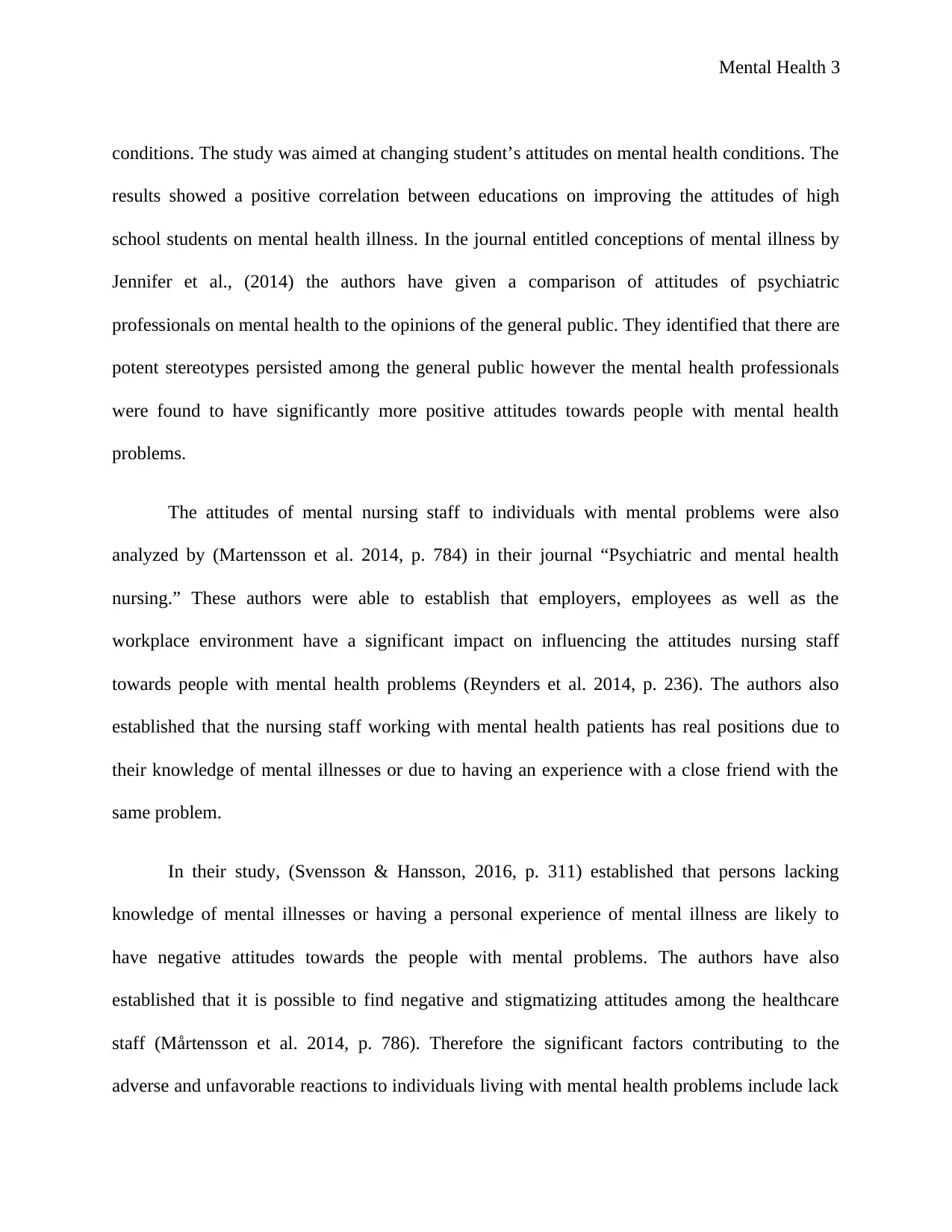
Mental Health 3
conditions. The study was aimed at changing student’s attitudes on mental health conditions. The
results showed a positive correlation between educations on improving the attitudes of high
school students on mental health illness. In the journal entitled conceptions of mental illness by
Jennifer et al., (2014) the authors have given a comparison of attitudes of psychiatric
professionals on mental health to the opinions of the general public. They identified that there are
potent stereotypes persisted among the general public however the mental health professionals
were found to have significantly more positive attitudes towards people with mental health
problems.
The attitudes of mental nursing staff to individuals with mental problems were also
analyzed by (Martensson et al. 2014, p. 784) in their journal “Psychiatric and mental health
nursing.” These authors were able to establish that employers, employees as well as the
workplace environment have a significant impact on influencing the attitudes nursing staff
towards people with mental health problems (Reynders et al. 2014, p. 236). The authors also
established that the nursing staff working with mental health patients has real positions due to
their knowledge of mental illnesses or due to having an experience with a close friend with the
same problem.
In their study, (Svensson & Hansson, 2016, p. 311) established that persons lacking
knowledge of mental illnesses or having a personal experience of mental illness are likely to
have negative attitudes towards the people with mental problems. The authors have also
established that it is possible to find negative and stigmatizing attitudes among the healthcare
staff (Mårtensson et al. 2014, p. 786). Therefore the significant factors contributing to the
adverse and unfavorable reactions to individuals living with mental health problems include lack
conditions. The study was aimed at changing student’s attitudes on mental health conditions. The
results showed a positive correlation between educations on improving the attitudes of high
school students on mental health illness. In the journal entitled conceptions of mental illness by
Jennifer et al., (2014) the authors have given a comparison of attitudes of psychiatric
professionals on mental health to the opinions of the general public. They identified that there are
potent stereotypes persisted among the general public however the mental health professionals
were found to have significantly more positive attitudes towards people with mental health
problems.
The attitudes of mental nursing staff to individuals with mental problems were also
analyzed by (Martensson et al. 2014, p. 784) in their journal “Psychiatric and mental health
nursing.” These authors were able to establish that employers, employees as well as the
workplace environment have a significant impact on influencing the attitudes nursing staff
towards people with mental health problems (Reynders et al. 2014, p. 236). The authors also
established that the nursing staff working with mental health patients has real positions due to
their knowledge of mental illnesses or due to having an experience with a close friend with the
same problem.
In their study, (Svensson & Hansson, 2016, p. 311) established that persons lacking
knowledge of mental illnesses or having a personal experience of mental illness are likely to
have negative attitudes towards the people with mental problems. The authors have also
established that it is possible to find negative and stigmatizing attitudes among the healthcare
staff (Mårtensson et al. 2014, p. 786). Therefore the significant factors contributing to the
adverse and unfavorable reactions to individuals living with mental health problems include lack
⊘ This is a preview!⊘
Do you want full access?
Subscribe today to unlock all pages.

Trusted by 1+ million students worldwide
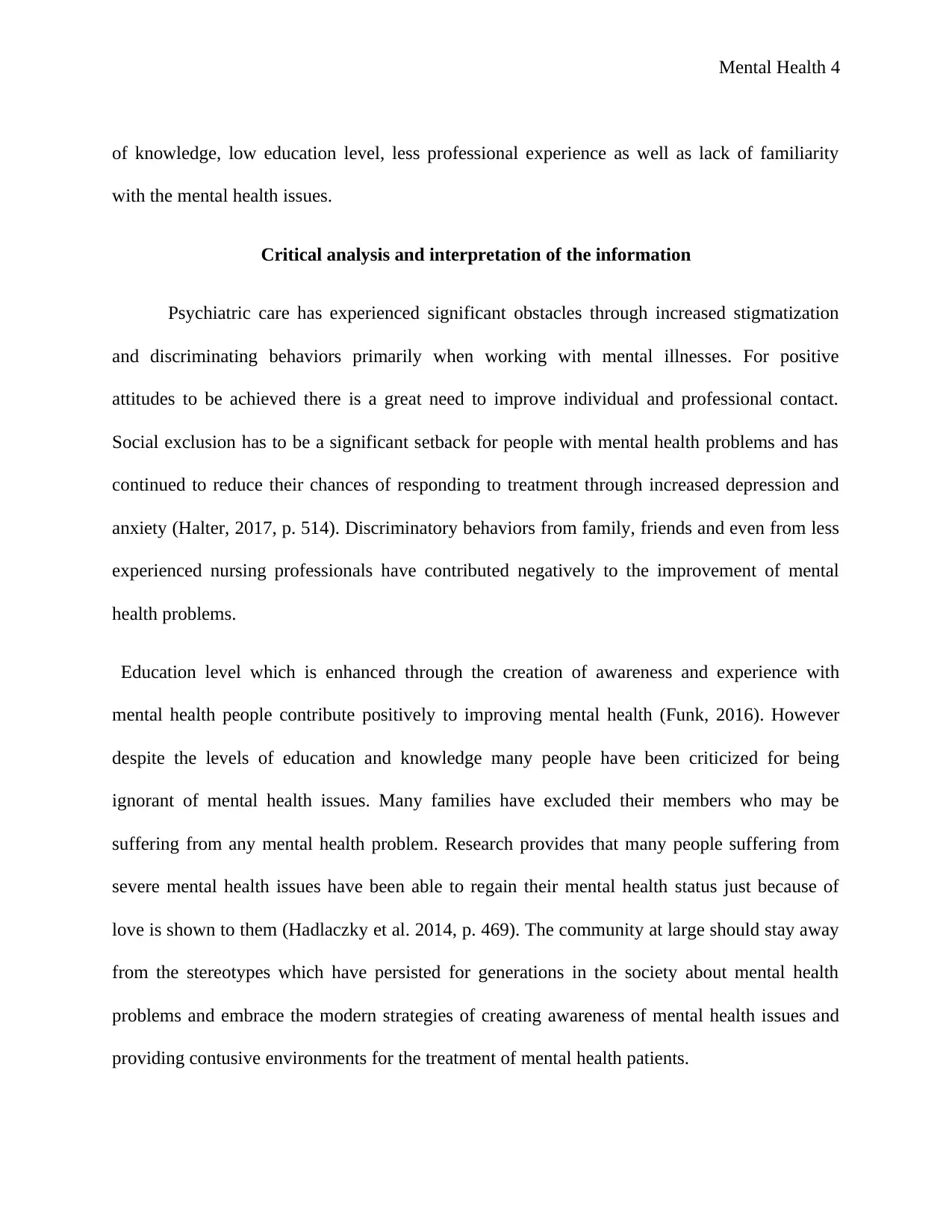
Mental Health 4
of knowledge, low education level, less professional experience as well as lack of familiarity
with the mental health issues.
Critical analysis and interpretation of the information
Psychiatric care has experienced significant obstacles through increased stigmatization
and discriminating behaviors primarily when working with mental illnesses. For positive
attitudes to be achieved there is a great need to improve individual and professional contact.
Social exclusion has to be a significant setback for people with mental health problems and has
continued to reduce their chances of responding to treatment through increased depression and
anxiety (Halter, 2017, p. 514). Discriminatory behaviors from family, friends and even from less
experienced nursing professionals have contributed negatively to the improvement of mental
health problems.
Education level which is enhanced through the creation of awareness and experience with
mental health people contribute positively to improving mental health (Funk, 2016). However
despite the levels of education and knowledge many people have been criticized for being
ignorant of mental health issues. Many families have excluded their members who may be
suffering from any mental health problem. Research provides that many people suffering from
severe mental health issues have been able to regain their mental health status just because of
love is shown to them (Hadlaczky et al. 2014, p. 469). The community at large should stay away
from the stereotypes which have persisted for generations in the society about mental health
problems and embrace the modern strategies of creating awareness of mental health issues and
providing contusive environments for the treatment of mental health patients.
of knowledge, low education level, less professional experience as well as lack of familiarity
with the mental health issues.
Critical analysis and interpretation of the information
Psychiatric care has experienced significant obstacles through increased stigmatization
and discriminating behaviors primarily when working with mental illnesses. For positive
attitudes to be achieved there is a great need to improve individual and professional contact.
Social exclusion has to be a significant setback for people with mental health problems and has
continued to reduce their chances of responding to treatment through increased depression and
anxiety (Halter, 2017, p. 514). Discriminatory behaviors from family, friends and even from less
experienced nursing professionals have contributed negatively to the improvement of mental
health problems.
Education level which is enhanced through the creation of awareness and experience with
mental health people contribute positively to improving mental health (Funk, 2016). However
despite the levels of education and knowledge many people have been criticized for being
ignorant of mental health issues. Many families have excluded their members who may be
suffering from any mental health problem. Research provides that many people suffering from
severe mental health issues have been able to regain their mental health status just because of
love is shown to them (Hadlaczky et al. 2014, p. 469). The community at large should stay away
from the stereotypes which have persisted for generations in the society about mental health
problems and embrace the modern strategies of creating awareness of mental health issues and
providing contusive environments for the treatment of mental health patients.
Paraphrase This Document
Need a fresh take? Get an instant paraphrase of this document with our AI Paraphraser
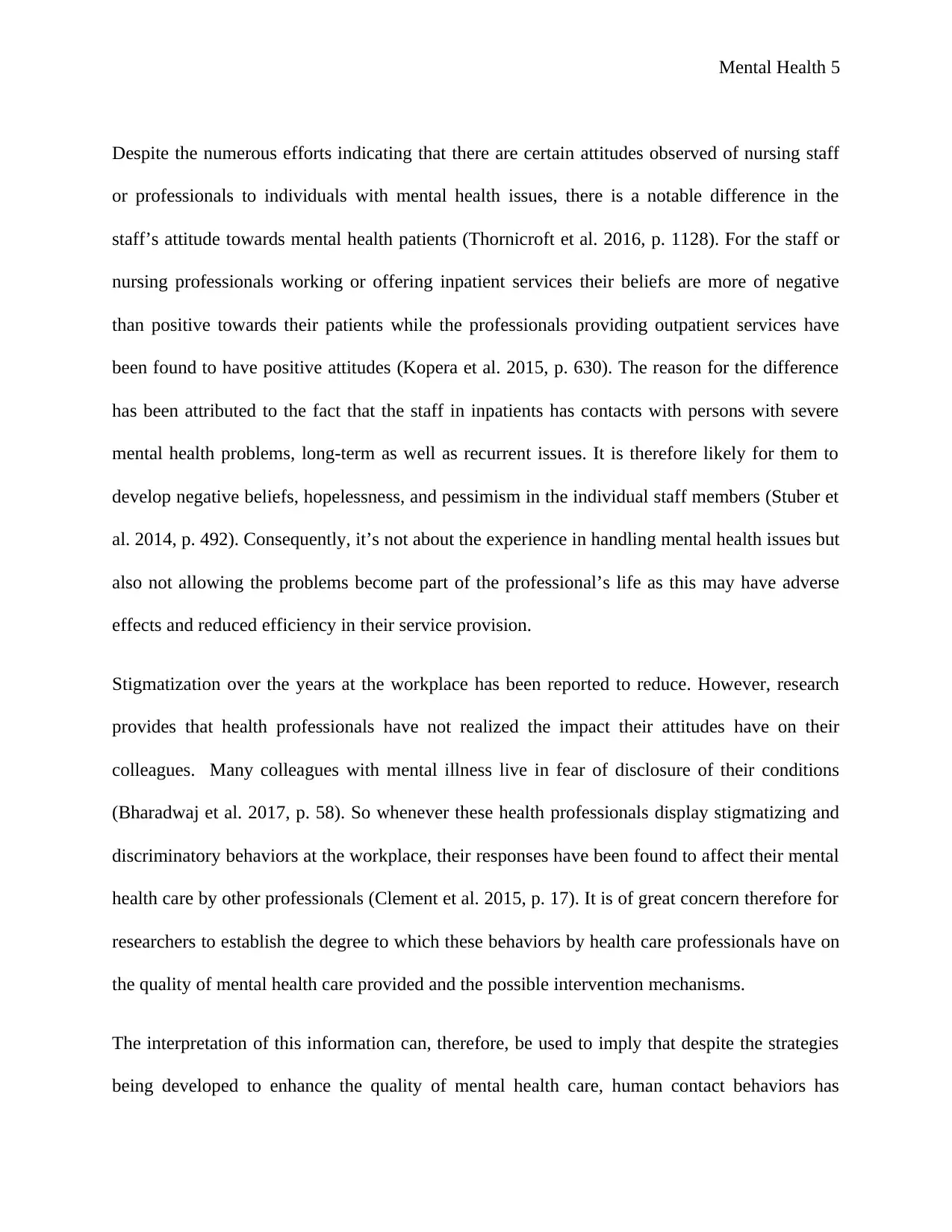
Mental Health 5
Despite the numerous efforts indicating that there are certain attitudes observed of nursing staff
or professionals to individuals with mental health issues, there is a notable difference in the
staff’s attitude towards mental health patients (Thornicroft et al. 2016, p. 1128). For the staff or
nursing professionals working or offering inpatient services their beliefs are more of negative
than positive towards their patients while the professionals providing outpatient services have
been found to have positive attitudes (Kopera et al. 2015, p. 630). The reason for the difference
has been attributed to the fact that the staff in inpatients has contacts with persons with severe
mental health problems, long-term as well as recurrent issues. It is therefore likely for them to
develop negative beliefs, hopelessness, and pessimism in the individual staff members (Stuber et
al. 2014, p. 492). Consequently, it’s not about the experience in handling mental health issues but
also not allowing the problems become part of the professional’s life as this may have adverse
effects and reduced efficiency in their service provision.
Stigmatization over the years at the workplace has been reported to reduce. However, research
provides that health professionals have not realized the impact their attitudes have on their
colleagues. Many colleagues with mental illness live in fear of disclosure of their conditions
(Bharadwaj et al. 2017, p. 58). So whenever these health professionals display stigmatizing and
discriminatory behaviors at the workplace, their responses have been found to affect their mental
health care by other professionals (Clement et al. 2015, p. 17). It is of great concern therefore for
researchers to establish the degree to which these behaviors by health care professionals have on
the quality of mental health care provided and the possible intervention mechanisms.
The interpretation of this information can, therefore, be used to imply that despite the strategies
being developed to enhance the quality of mental health care, human contact behaviors has
Despite the numerous efforts indicating that there are certain attitudes observed of nursing staff
or professionals to individuals with mental health issues, there is a notable difference in the
staff’s attitude towards mental health patients (Thornicroft et al. 2016, p. 1128). For the staff or
nursing professionals working or offering inpatient services their beliefs are more of negative
than positive towards their patients while the professionals providing outpatient services have
been found to have positive attitudes (Kopera et al. 2015, p. 630). The reason for the difference
has been attributed to the fact that the staff in inpatients has contacts with persons with severe
mental health problems, long-term as well as recurrent issues. It is therefore likely for them to
develop negative beliefs, hopelessness, and pessimism in the individual staff members (Stuber et
al. 2014, p. 492). Consequently, it’s not about the experience in handling mental health issues but
also not allowing the problems become part of the professional’s life as this may have adverse
effects and reduced efficiency in their service provision.
Stigmatization over the years at the workplace has been reported to reduce. However, research
provides that health professionals have not realized the impact their attitudes have on their
colleagues. Many colleagues with mental illness live in fear of disclosure of their conditions
(Bharadwaj et al. 2017, p. 58). So whenever these health professionals display stigmatizing and
discriminatory behaviors at the workplace, their responses have been found to affect their mental
health care by other professionals (Clement et al. 2015, p. 17). It is of great concern therefore for
researchers to establish the degree to which these behaviors by health care professionals have on
the quality of mental health care provided and the possible intervention mechanisms.
The interpretation of this information can, therefore, be used to imply that despite the strategies
being developed to enhance the quality of mental health care, human contact behaviors has
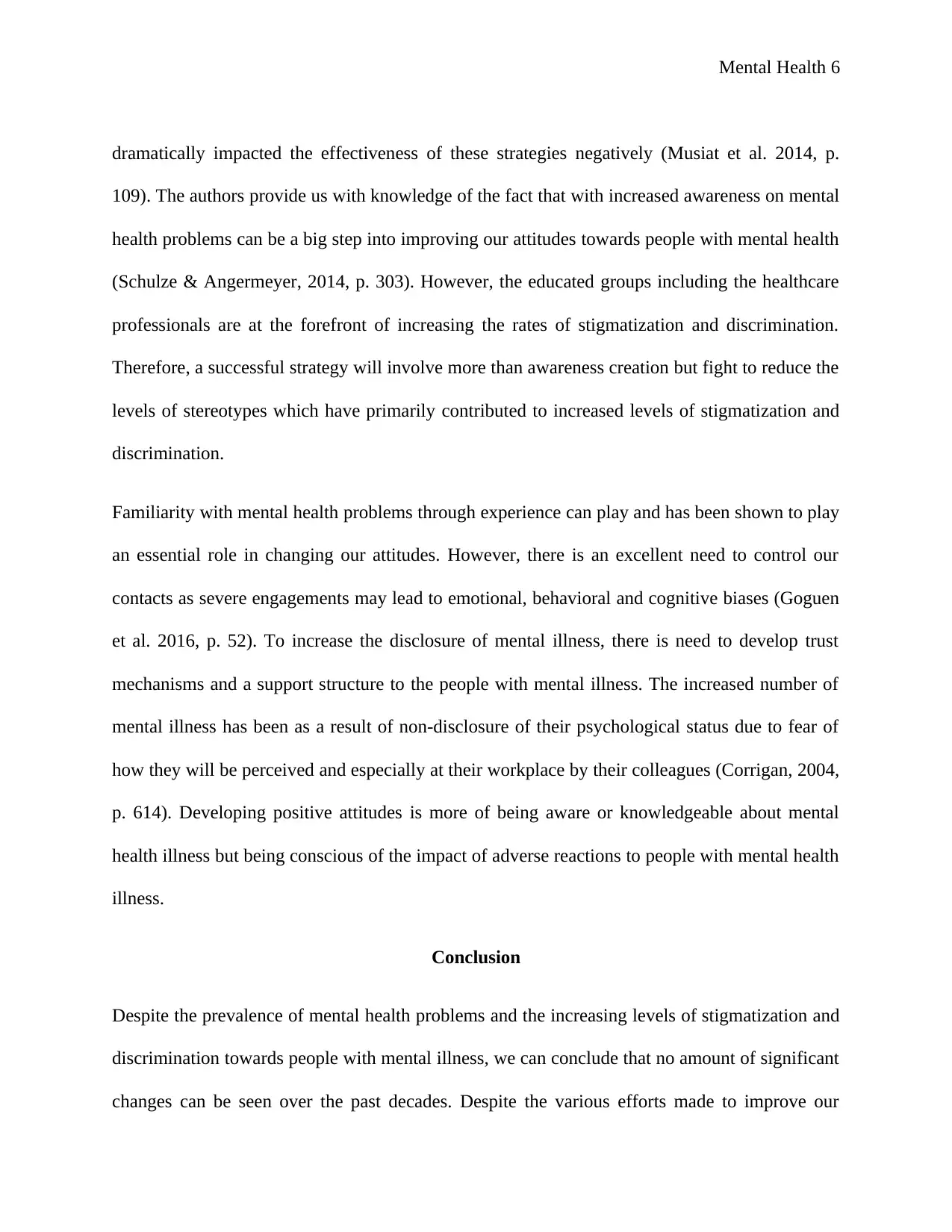
Mental Health 6
dramatically impacted the effectiveness of these strategies negatively (Musiat et al. 2014, p.
109). The authors provide us with knowledge of the fact that with increased awareness on mental
health problems can be a big step into improving our attitudes towards people with mental health
(Schulze & Angermeyer, 2014, p. 303). However, the educated groups including the healthcare
professionals are at the forefront of increasing the rates of stigmatization and discrimination.
Therefore, a successful strategy will involve more than awareness creation but fight to reduce the
levels of stereotypes which have primarily contributed to increased levels of stigmatization and
discrimination.
Familiarity with mental health problems through experience can play and has been shown to play
an essential role in changing our attitudes. However, there is an excellent need to control our
contacts as severe engagements may lead to emotional, behavioral and cognitive biases (Goguen
et al. 2016, p. 52). To increase the disclosure of mental illness, there is need to develop trust
mechanisms and a support structure to the people with mental illness. The increased number of
mental illness has been as a result of non-disclosure of their psychological status due to fear of
how they will be perceived and especially at their workplace by their colleagues (Corrigan, 2004,
p. 614). Developing positive attitudes is more of being aware or knowledgeable about mental
health illness but being conscious of the impact of adverse reactions to people with mental health
illness.
Conclusion
Despite the prevalence of mental health problems and the increasing levels of stigmatization and
discrimination towards people with mental illness, we can conclude that no amount of significant
changes can be seen over the past decades. Despite the various efforts made to improve our
dramatically impacted the effectiveness of these strategies negatively (Musiat et al. 2014, p.
109). The authors provide us with knowledge of the fact that with increased awareness on mental
health problems can be a big step into improving our attitudes towards people with mental health
(Schulze & Angermeyer, 2014, p. 303). However, the educated groups including the healthcare
professionals are at the forefront of increasing the rates of stigmatization and discrimination.
Therefore, a successful strategy will involve more than awareness creation but fight to reduce the
levels of stereotypes which have primarily contributed to increased levels of stigmatization and
discrimination.
Familiarity with mental health problems through experience can play and has been shown to play
an essential role in changing our attitudes. However, there is an excellent need to control our
contacts as severe engagements may lead to emotional, behavioral and cognitive biases (Goguen
et al. 2016, p. 52). To increase the disclosure of mental illness, there is need to develop trust
mechanisms and a support structure to the people with mental illness. The increased number of
mental illness has been as a result of non-disclosure of their psychological status due to fear of
how they will be perceived and especially at their workplace by their colleagues (Corrigan, 2004,
p. 614). Developing positive attitudes is more of being aware or knowledgeable about mental
health illness but being conscious of the impact of adverse reactions to people with mental health
illness.
Conclusion
Despite the prevalence of mental health problems and the increasing levels of stigmatization and
discrimination towards people with mental illness, we can conclude that no amount of significant
changes can be seen over the past decades. Despite the various efforts made to improve our
⊘ This is a preview!⊘
Do you want full access?
Subscribe today to unlock all pages.

Trusted by 1+ million students worldwide
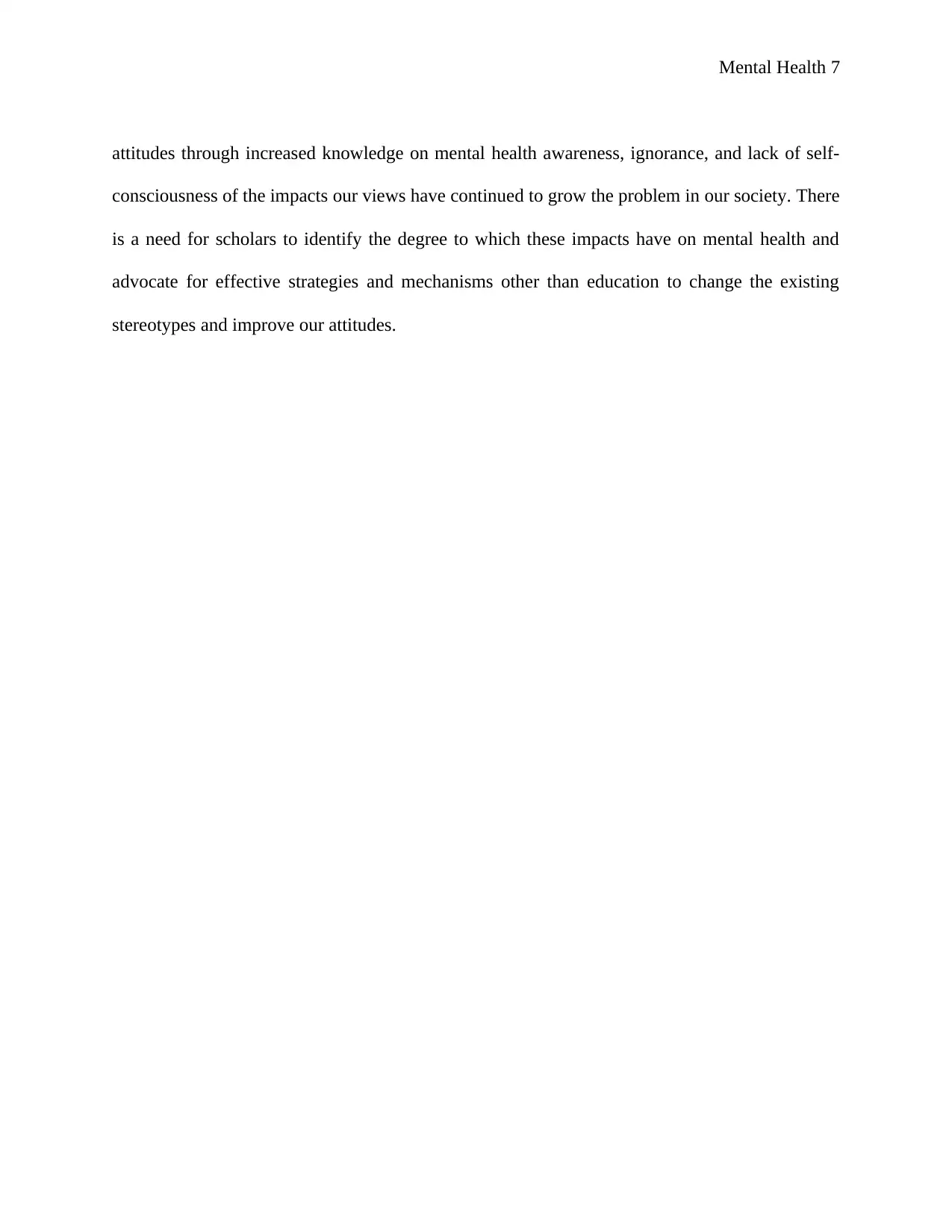
Mental Health 7
attitudes through increased knowledge on mental health awareness, ignorance, and lack of self-
consciousness of the impacts our views have continued to grow the problem in our society. There
is a need for scholars to identify the degree to which these impacts have on mental health and
advocate for effective strategies and mechanisms other than education to change the existing
stereotypes and improve our attitudes.
attitudes through increased knowledge on mental health awareness, ignorance, and lack of self-
consciousness of the impacts our views have continued to grow the problem in our society. There
is a need for scholars to identify the degree to which these impacts have on mental health and
advocate for effective strategies and mechanisms other than education to change the existing
stereotypes and improve our attitudes.
Paraphrase This Document
Need a fresh take? Get an instant paraphrase of this document with our AI Paraphraser
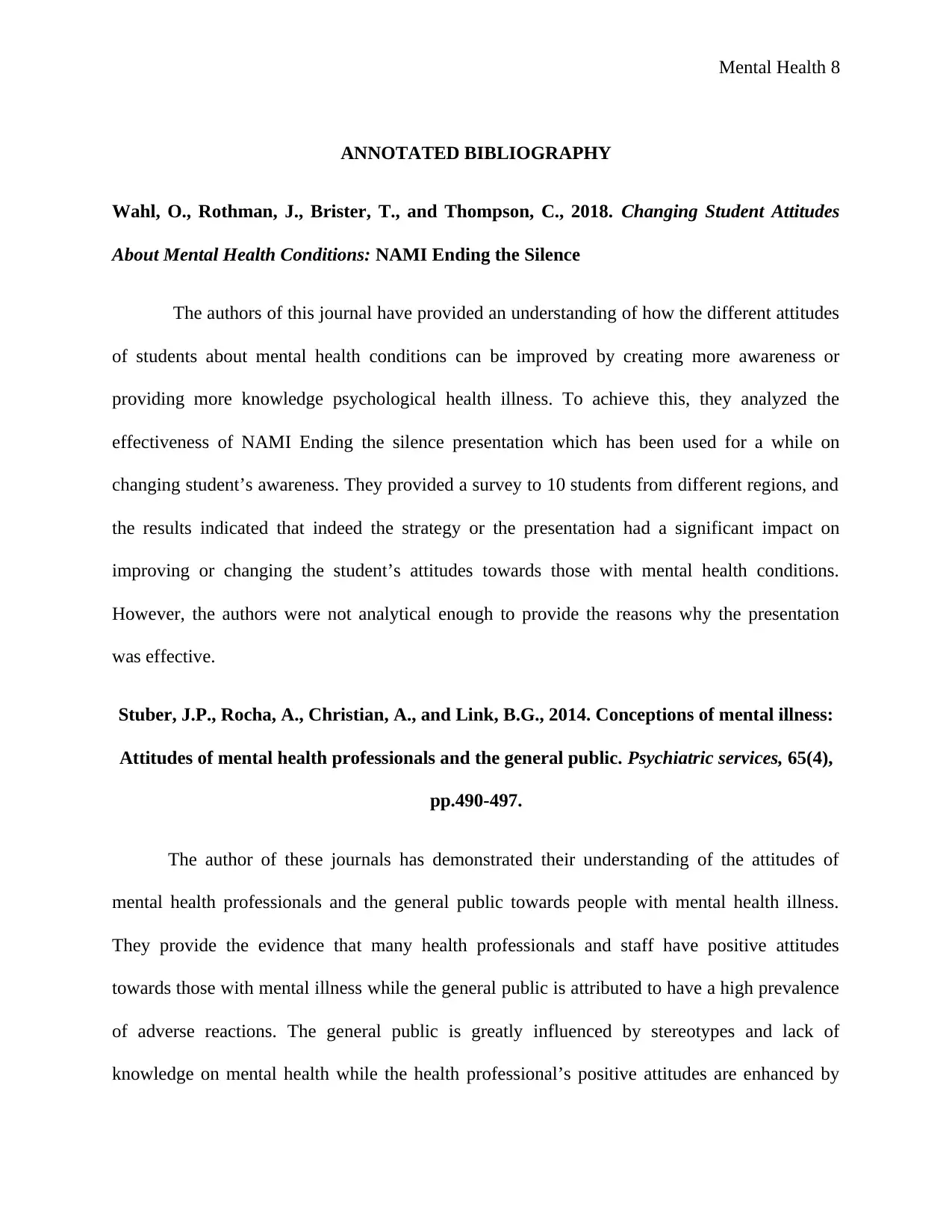
Mental Health 8
ANNOTATED BIBLIOGRAPHY
Wahl, O., Rothman, J., Brister, T., and Thompson, C., 2018. Changing Student Attitudes
About Mental Health Conditions: NAMI Ending the Silence
The authors of this journal have provided an understanding of how the different attitudes
of students about mental health conditions can be improved by creating more awareness or
providing more knowledge psychological health illness. To achieve this, they analyzed the
effectiveness of NAMI Ending the silence presentation which has been used for a while on
changing student’s awareness. They provided a survey to 10 students from different regions, and
the results indicated that indeed the strategy or the presentation had a significant impact on
improving or changing the student’s attitudes towards those with mental health conditions.
However, the authors were not analytical enough to provide the reasons why the presentation
was effective.
Stuber, J.P., Rocha, A., Christian, A., and Link, B.G., 2014. Conceptions of mental illness:
Attitudes of mental health professionals and the general public. Psychiatric services, 65(4),
pp.490-497.
The author of these journals has demonstrated their understanding of the attitudes of
mental health professionals and the general public towards people with mental health illness.
They provide the evidence that many health professionals and staff have positive attitudes
towards those with mental illness while the general public is attributed to have a high prevalence
of adverse reactions. The general public is greatly influenced by stereotypes and lack of
knowledge on mental health while the health professional’s positive attitudes are enhanced by
ANNOTATED BIBLIOGRAPHY
Wahl, O., Rothman, J., Brister, T., and Thompson, C., 2018. Changing Student Attitudes
About Mental Health Conditions: NAMI Ending the Silence
The authors of this journal have provided an understanding of how the different attitudes
of students about mental health conditions can be improved by creating more awareness or
providing more knowledge psychological health illness. To achieve this, they analyzed the
effectiveness of NAMI Ending the silence presentation which has been used for a while on
changing student’s awareness. They provided a survey to 10 students from different regions, and
the results indicated that indeed the strategy or the presentation had a significant impact on
improving or changing the student’s attitudes towards those with mental health conditions.
However, the authors were not analytical enough to provide the reasons why the presentation
was effective.
Stuber, J.P., Rocha, A., Christian, A., and Link, B.G., 2014. Conceptions of mental illness:
Attitudes of mental health professionals and the general public. Psychiatric services, 65(4),
pp.490-497.
The author of these journals has demonstrated their understanding of the attitudes of
mental health professionals and the general public towards people with mental health illness.
They provide the evidence that many health professionals and staff have positive attitudes
towards those with mental illness while the general public is attributed to have a high prevalence
of adverse reactions. The general public is greatly influenced by stereotypes and lack of
knowledge on mental health while the health professional’s positive attitudes are enhanced by
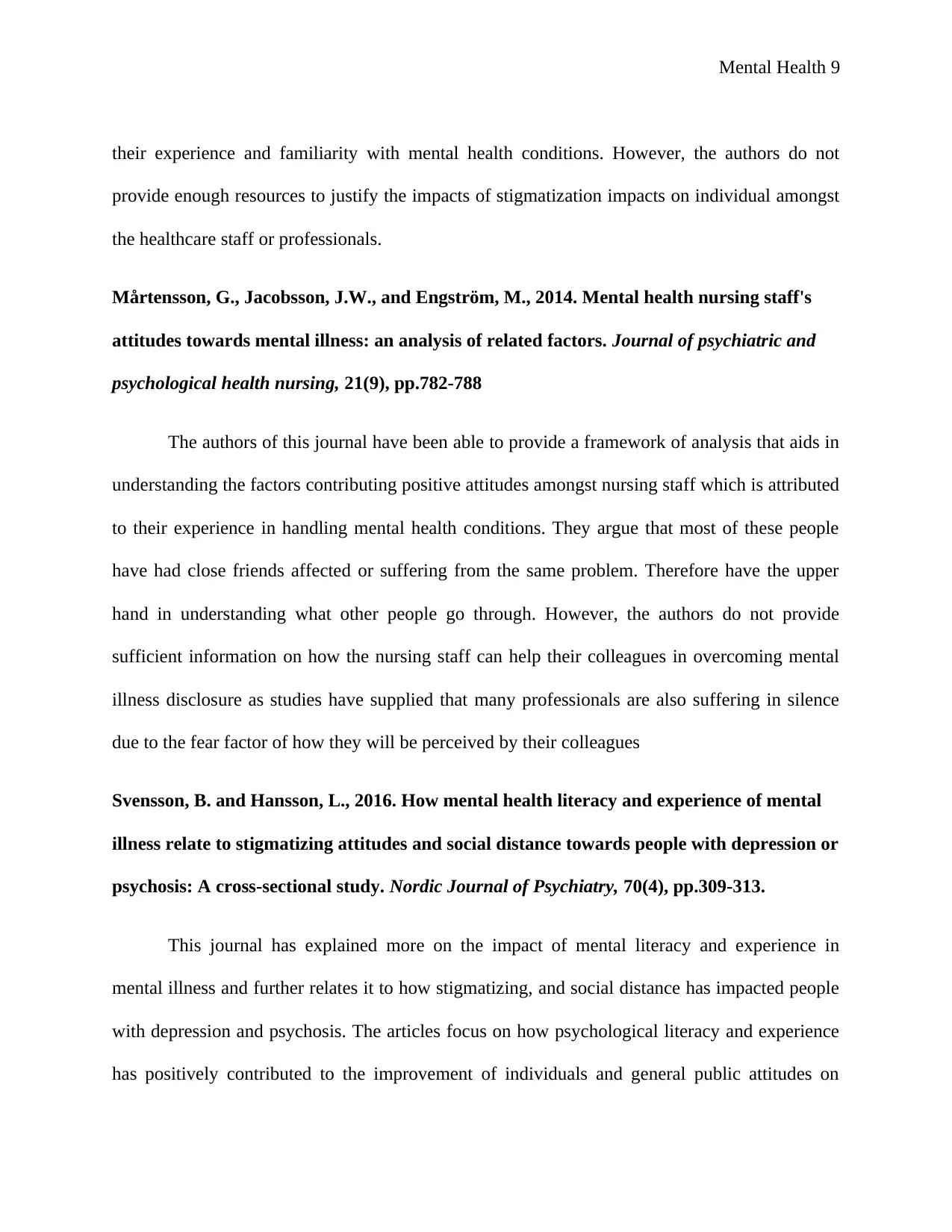
Mental Health 9
their experience and familiarity with mental health conditions. However, the authors do not
provide enough resources to justify the impacts of stigmatization impacts on individual amongst
the healthcare staff or professionals.
Mårtensson, G., Jacobsson, J.W., and Engström, M., 2014. Mental health nursing staff's
attitudes towards mental illness: an analysis of related factors. Journal of psychiatric and
psychological health nursing, 21(9), pp.782-788
The authors of this journal have been able to provide a framework of analysis that aids in
understanding the factors contributing positive attitudes amongst nursing staff which is attributed
to their experience in handling mental health conditions. They argue that most of these people
have had close friends affected or suffering from the same problem. Therefore have the upper
hand in understanding what other people go through. However, the authors do not provide
sufficient information on how the nursing staff can help their colleagues in overcoming mental
illness disclosure as studies have supplied that many professionals are also suffering in silence
due to the fear factor of how they will be perceived by their colleagues
Svensson, B. and Hansson, L., 2016. How mental health literacy and experience of mental
illness relate to stigmatizing attitudes and social distance towards people with depression or
psychosis: A cross-sectional study. Nordic Journal of Psychiatry, 70(4), pp.309-313.
This journal has explained more on the impact of mental literacy and experience in
mental illness and further relates it to how stigmatizing, and social distance has impacted people
with depression and psychosis. The articles focus on how psychological literacy and experience
has positively contributed to the improvement of individuals and general public attitudes on
their experience and familiarity with mental health conditions. However, the authors do not
provide enough resources to justify the impacts of stigmatization impacts on individual amongst
the healthcare staff or professionals.
Mårtensson, G., Jacobsson, J.W., and Engström, M., 2014. Mental health nursing staff's
attitudes towards mental illness: an analysis of related factors. Journal of psychiatric and
psychological health nursing, 21(9), pp.782-788
The authors of this journal have been able to provide a framework of analysis that aids in
understanding the factors contributing positive attitudes amongst nursing staff which is attributed
to their experience in handling mental health conditions. They argue that most of these people
have had close friends affected or suffering from the same problem. Therefore have the upper
hand in understanding what other people go through. However, the authors do not provide
sufficient information on how the nursing staff can help their colleagues in overcoming mental
illness disclosure as studies have supplied that many professionals are also suffering in silence
due to the fear factor of how they will be perceived by their colleagues
Svensson, B. and Hansson, L., 2016. How mental health literacy and experience of mental
illness relate to stigmatizing attitudes and social distance towards people with depression or
psychosis: A cross-sectional study. Nordic Journal of Psychiatry, 70(4), pp.309-313.
This journal has explained more on the impact of mental literacy and experience in
mental illness and further relates it to how stigmatizing, and social distance has impacted people
with depression and psychosis. The articles focus on how psychological literacy and experience
has positively contributed to the improvement of individuals and general public attitudes on
⊘ This is a preview!⊘
Do you want full access?
Subscribe today to unlock all pages.

Trusted by 1+ million students worldwide
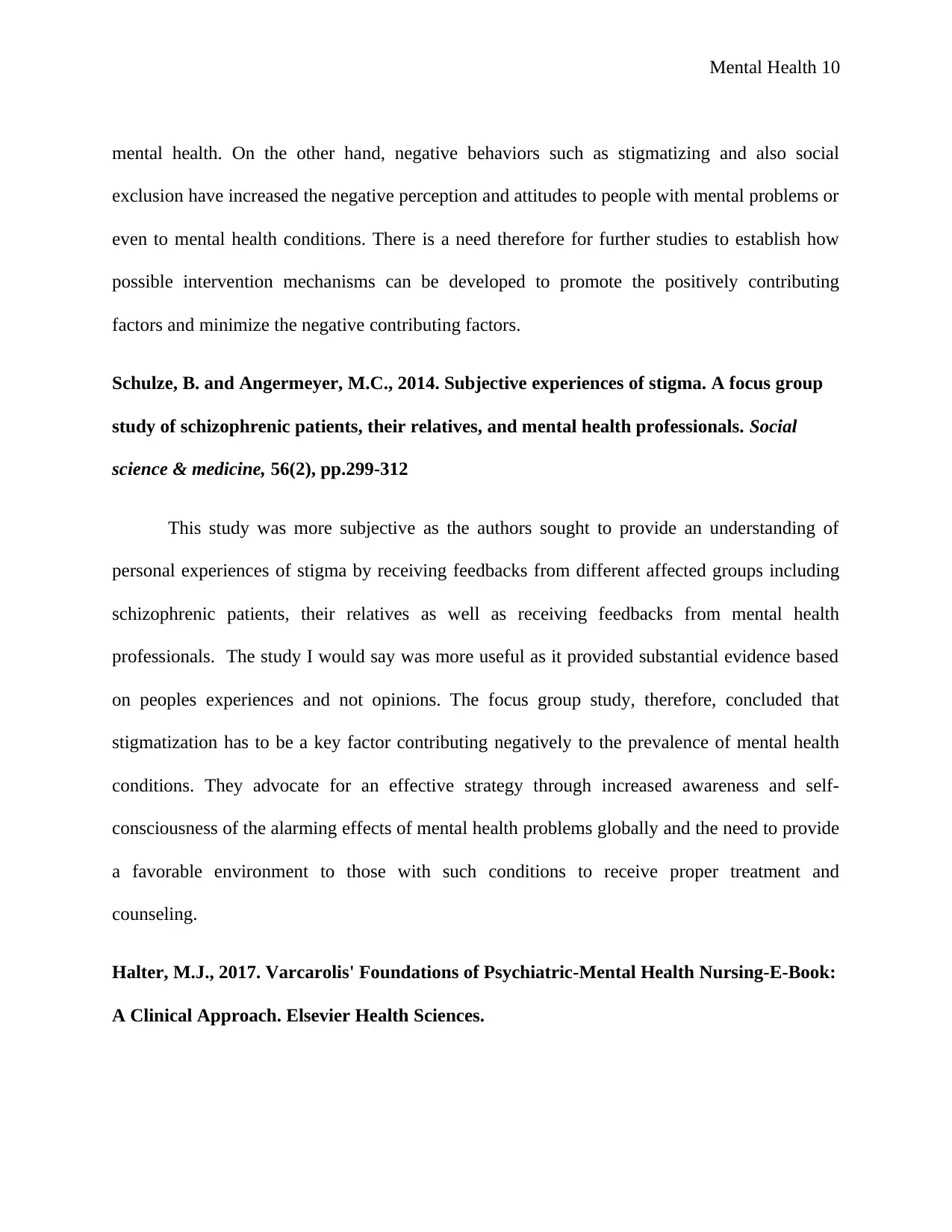
Mental Health 10
mental health. On the other hand, negative behaviors such as stigmatizing and also social
exclusion have increased the negative perception and attitudes to people with mental problems or
even to mental health conditions. There is a need therefore for further studies to establish how
possible intervention mechanisms can be developed to promote the positively contributing
factors and minimize the negative contributing factors.
Schulze, B. and Angermeyer, M.C., 2014. Subjective experiences of stigma. A focus group
study of schizophrenic patients, their relatives, and mental health professionals. Social
science & medicine, 56(2), pp.299-312
This study was more subjective as the authors sought to provide an understanding of
personal experiences of stigma by receiving feedbacks from different affected groups including
schizophrenic patients, their relatives as well as receiving feedbacks from mental health
professionals. The study I would say was more useful as it provided substantial evidence based
on peoples experiences and not opinions. The focus group study, therefore, concluded that
stigmatization has to be a key factor contributing negatively to the prevalence of mental health
conditions. They advocate for an effective strategy through increased awareness and self-
consciousness of the alarming effects of mental health problems globally and the need to provide
a favorable environment to those with such conditions to receive proper treatment and
counseling.
Halter, M.J., 2017. Varcarolis' Foundations of Psychiatric-Mental Health Nursing-E-Book:
A Clinical Approach. Elsevier Health Sciences.
mental health. On the other hand, negative behaviors such as stigmatizing and also social
exclusion have increased the negative perception and attitudes to people with mental problems or
even to mental health conditions. There is a need therefore for further studies to establish how
possible intervention mechanisms can be developed to promote the positively contributing
factors and minimize the negative contributing factors.
Schulze, B. and Angermeyer, M.C., 2014. Subjective experiences of stigma. A focus group
study of schizophrenic patients, their relatives, and mental health professionals. Social
science & medicine, 56(2), pp.299-312
This study was more subjective as the authors sought to provide an understanding of
personal experiences of stigma by receiving feedbacks from different affected groups including
schizophrenic patients, their relatives as well as receiving feedbacks from mental health
professionals. The study I would say was more useful as it provided substantial evidence based
on peoples experiences and not opinions. The focus group study, therefore, concluded that
stigmatization has to be a key factor contributing negatively to the prevalence of mental health
conditions. They advocate for an effective strategy through increased awareness and self-
consciousness of the alarming effects of mental health problems globally and the need to provide
a favorable environment to those with such conditions to receive proper treatment and
counseling.
Halter, M.J., 2017. Varcarolis' Foundations of Psychiatric-Mental Health Nursing-E-Book:
A Clinical Approach. Elsevier Health Sciences.
Paraphrase This Document
Need a fresh take? Get an instant paraphrase of this document with our AI Paraphraser
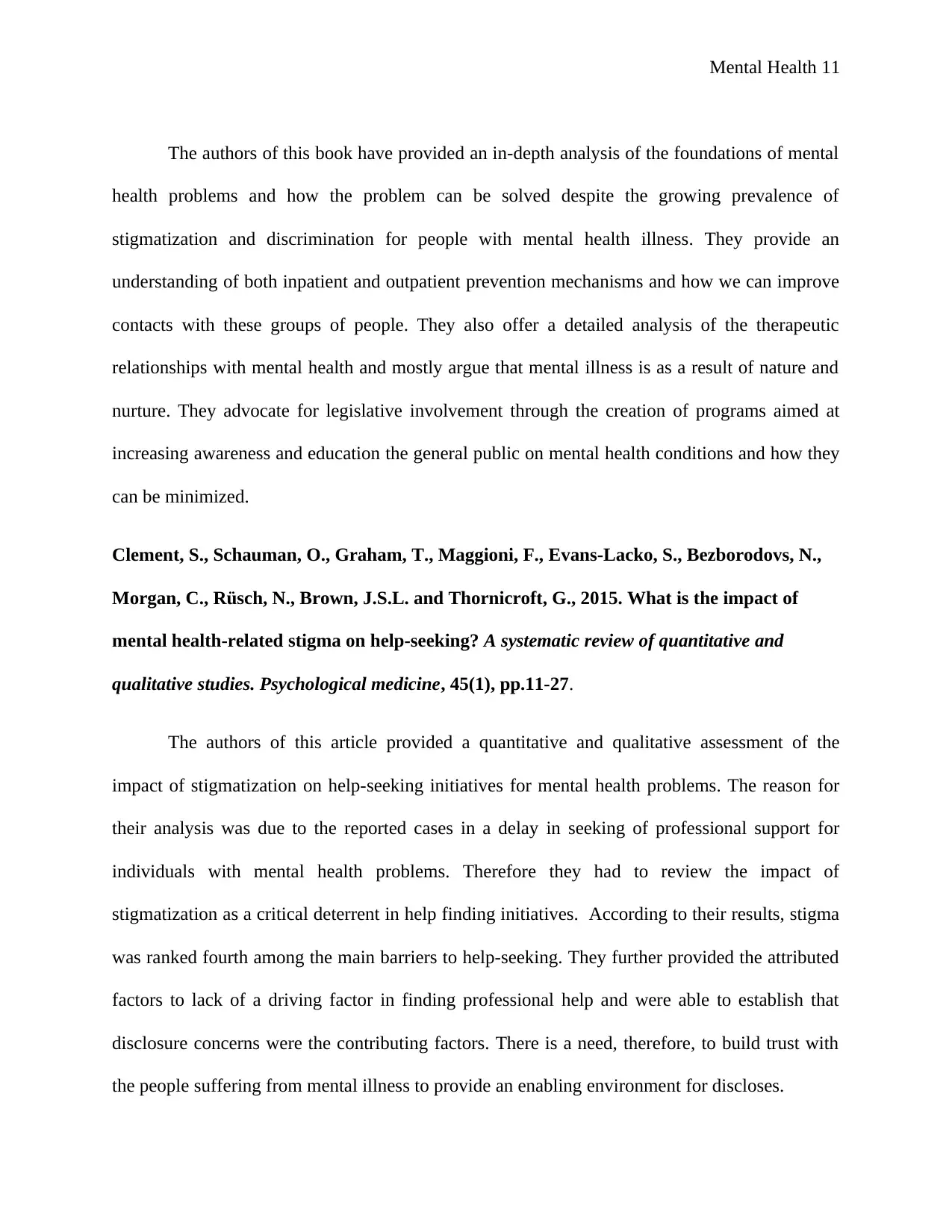
Mental Health 11
The authors of this book have provided an in-depth analysis of the foundations of mental
health problems and how the problem can be solved despite the growing prevalence of
stigmatization and discrimination for people with mental health illness. They provide an
understanding of both inpatient and outpatient prevention mechanisms and how we can improve
contacts with these groups of people. They also offer a detailed analysis of the therapeutic
relationships with mental health and mostly argue that mental illness is as a result of nature and
nurture. They advocate for legislative involvement through the creation of programs aimed at
increasing awareness and education the general public on mental health conditions and how they
can be minimized.
Clement, S., Schauman, O., Graham, T., Maggioni, F., Evans-Lacko, S., Bezborodovs, N.,
Morgan, C., Rüsch, N., Brown, J.S.L. and Thornicroft, G., 2015. What is the impact of
mental health-related stigma on help-seeking? A systematic review of quantitative and
qualitative studies. Psychological medicine, 45(1), pp.11-27.
The authors of this article provided a quantitative and qualitative assessment of the
impact of stigmatization on help-seeking initiatives for mental health problems. The reason for
their analysis was due to the reported cases in a delay in seeking of professional support for
individuals with mental health problems. Therefore they had to review the impact of
stigmatization as a critical deterrent in help finding initiatives. According to their results, stigma
was ranked fourth among the main barriers to help-seeking. They further provided the attributed
factors to lack of a driving factor in finding professional help and were able to establish that
disclosure concerns were the contributing factors. There is a need, therefore, to build trust with
the people suffering from mental illness to provide an enabling environment for discloses.
The authors of this book have provided an in-depth analysis of the foundations of mental
health problems and how the problem can be solved despite the growing prevalence of
stigmatization and discrimination for people with mental health illness. They provide an
understanding of both inpatient and outpatient prevention mechanisms and how we can improve
contacts with these groups of people. They also offer a detailed analysis of the therapeutic
relationships with mental health and mostly argue that mental illness is as a result of nature and
nurture. They advocate for legislative involvement through the creation of programs aimed at
increasing awareness and education the general public on mental health conditions and how they
can be minimized.
Clement, S., Schauman, O., Graham, T., Maggioni, F., Evans-Lacko, S., Bezborodovs, N.,
Morgan, C., Rüsch, N., Brown, J.S.L. and Thornicroft, G., 2015. What is the impact of
mental health-related stigma on help-seeking? A systematic review of quantitative and
qualitative studies. Psychological medicine, 45(1), pp.11-27.
The authors of this article provided a quantitative and qualitative assessment of the
impact of stigmatization on help-seeking initiatives for mental health problems. The reason for
their analysis was due to the reported cases in a delay in seeking of professional support for
individuals with mental health problems. Therefore they had to review the impact of
stigmatization as a critical deterrent in help finding initiatives. According to their results, stigma
was ranked fourth among the main barriers to help-seeking. They further provided the attributed
factors to lack of a driving factor in finding professional help and were able to establish that
disclosure concerns were the contributing factors. There is a need, therefore, to build trust with
the people suffering from mental illness to provide an enabling environment for discloses.
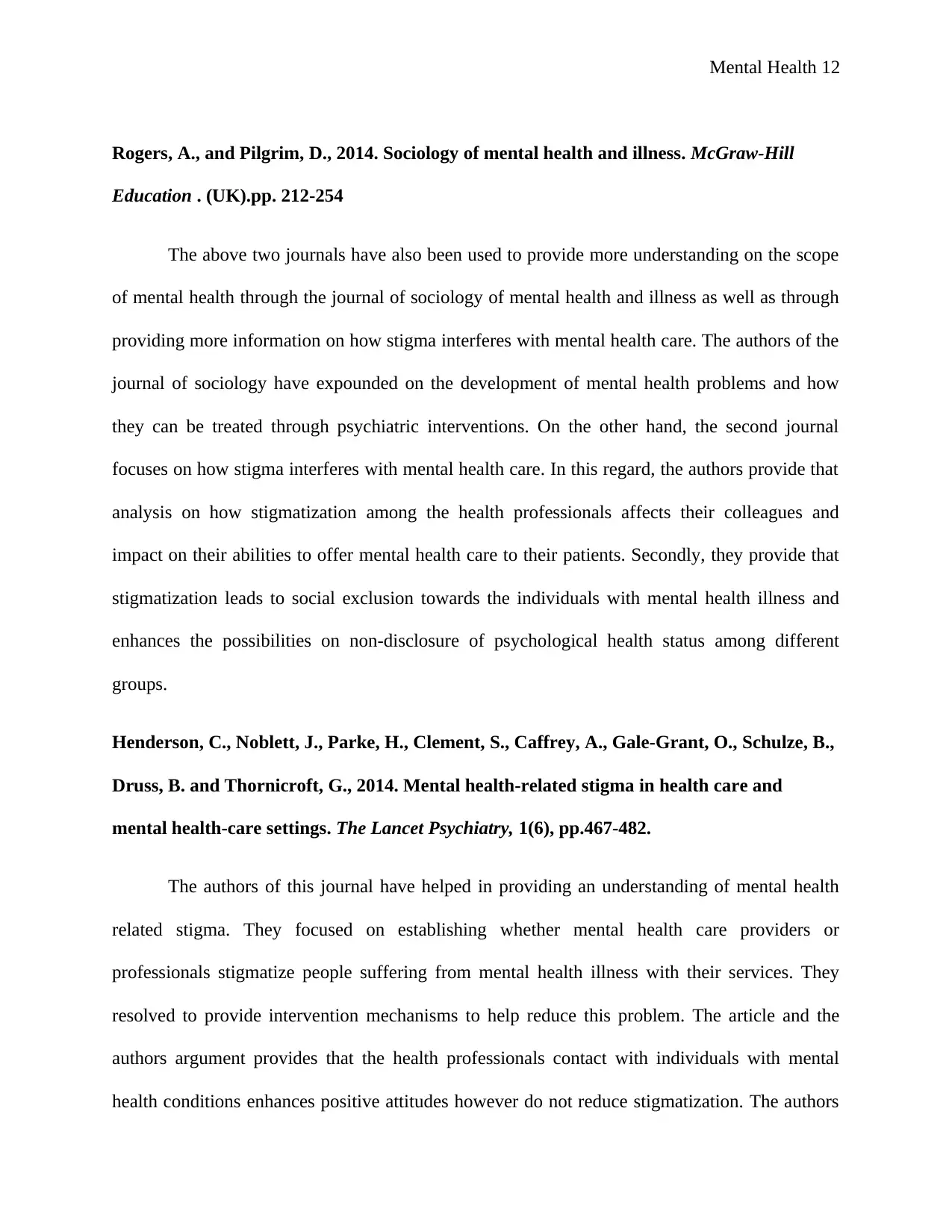
Mental Health 12
Rogers, A., and Pilgrim, D., 2014. Sociology of mental health and illness. McGraw-Hill
Education . (UK).pp. 212-254
The above two journals have also been used to provide more understanding on the scope
of mental health through the journal of sociology of mental health and illness as well as through
providing more information on how stigma interferes with mental health care. The authors of the
journal of sociology have expounded on the development of mental health problems and how
they can be treated through psychiatric interventions. On the other hand, the second journal
focuses on how stigma interferes with mental health care. In this regard, the authors provide that
analysis on how stigmatization among the health professionals affects their colleagues and
impact on their abilities to offer mental health care to their patients. Secondly, they provide that
stigmatization leads to social exclusion towards the individuals with mental health illness and
enhances the possibilities on non-disclosure of psychological health status among different
groups.
Henderson, C., Noblett, J., Parke, H., Clement, S., Caffrey, A., Gale-Grant, O., Schulze, B.,
Druss, B. and Thornicroft, G., 2014. Mental health-related stigma in health care and
mental health-care settings. The Lancet Psychiatry, 1(6), pp.467-482.
The authors of this journal have helped in providing an understanding of mental health
related stigma. They focused on establishing whether mental health care providers or
professionals stigmatize people suffering from mental health illness with their services. They
resolved to provide intervention mechanisms to help reduce this problem. The article and the
authors argument provides that the health professionals contact with individuals with mental
health conditions enhances positive attitudes however do not reduce stigmatization. The authors
Rogers, A., and Pilgrim, D., 2014. Sociology of mental health and illness. McGraw-Hill
Education . (UK).pp. 212-254
The above two journals have also been used to provide more understanding on the scope
of mental health through the journal of sociology of mental health and illness as well as through
providing more information on how stigma interferes with mental health care. The authors of the
journal of sociology have expounded on the development of mental health problems and how
they can be treated through psychiatric interventions. On the other hand, the second journal
focuses on how stigma interferes with mental health care. In this regard, the authors provide that
analysis on how stigmatization among the health professionals affects their colleagues and
impact on their abilities to offer mental health care to their patients. Secondly, they provide that
stigmatization leads to social exclusion towards the individuals with mental health illness and
enhances the possibilities on non-disclosure of psychological health status among different
groups.
Henderson, C., Noblett, J., Parke, H., Clement, S., Caffrey, A., Gale-Grant, O., Schulze, B.,
Druss, B. and Thornicroft, G., 2014. Mental health-related stigma in health care and
mental health-care settings. The Lancet Psychiatry, 1(6), pp.467-482.
The authors of this journal have helped in providing an understanding of mental health
related stigma. They focused on establishing whether mental health care providers or
professionals stigmatize people suffering from mental health illness with their services. They
resolved to provide intervention mechanisms to help reduce this problem. The article and the
authors argument provides that the health professionals contact with individuals with mental
health conditions enhances positive attitudes however do not reduce stigmatization. The authors
⊘ This is a preview!⊘
Do you want full access?
Subscribe today to unlock all pages.

Trusted by 1+ million students worldwide
1 out of 17
Related Documents
Your All-in-One AI-Powered Toolkit for Academic Success.
+13062052269
info@desklib.com
Available 24*7 on WhatsApp / Email
![[object Object]](/_next/static/media/star-bottom.7253800d.svg)
Unlock your academic potential
Copyright © 2020–2026 A2Z Services. All Rights Reserved. Developed and managed by ZUCOL.





